SB 1.4.28 (1962): Difference between revisions
(Created page with '<div style="float:left">'''Goto SB 1.4.28 Current Edition'''</div> <div style="float:right">[[File:Go-previous.png|link=SB 1962 Fourth Chapter - Appearance of Sri N…') |
(Vanibot #0020: VersionCompareLinker - added a link to the Version Compare feature) |
||
| Line 1: | Line 1: | ||
<div style="float:left">'''[[SB | [[Category:Srimad-Bhagavatam (1962-1965) - Canto 01 Chapter 04]] | ||
<div style="float:right">[[File:Go-previous.png|link=SB 1962 | <div style="float:left">[[File:Go-previous.png|link=SB (1962) Fourth Chapter - Appearance of Sri Narada]] '''[[SB (1962) Fourth Chapter - Appearance of Sri Narada]]'''</div> | ||
<div style="float:right">[[File:Go-previous.png|link=SB 1.4.27 (1962)]] '''[[SB 1.4.27 (1962)]] - [[SB 1.4.29 (1962)]]'''[[File:Go-next.png|link=SB 1.4.29 (1962)]]</div> | |||
{{CompareVersions|SB|1.4.28|SB 1962|SB 1972-77}} | |||
{{RandomImage}} | {{RandomImage}} | ||
| Line 6: | Line 8: | ||
==== TEXT No. 28 ==== | ==== TEXT No. 28 ==== | ||
<div class="SB65verse"> | |||
Dhritabratena mayahi chhandansi gurabagnayah | |||
Manita nirbalikena grihitan cha nushasanam. | |||
Bharata byapadeshena hi amnayarthaha pradarsitah | |||
Drishyate yatra dharmadi stri sudradivi rapyuta. | |||
</div> | |||
==== ENGLISH SYNONYMS ==== | ==== ENGLISH SYNONYMS ==== | ||
<div class="synonyms"> | |||
<div | |||
Dhritabratena—under strict disciplinary vow, Maya—by me, Hi—certainly, Chhandansi—the Vedic hymns, Gurabo—the spiritual masters, Agnaya—the sacrificial fire, Manita—properly worshipped, Nirbalikena—without any pretence, Grihitancha—also accepted, Anushasanam—traditional discipline, Bharata—the Mahabhrata, Byapodeshenn—by compilation of, Hi—certainly, Amnayarthaha—import by disciplic succession, Pradarshitah—properly explained, Drishyate—by which necessary, Dharmadi—the path of religion, Stri Sudradivih—even by the woman and Sudras—etc. | Dhritabratena—under strict disciplinary vow, Maya—by me, Hi—certainly, Chhandansi—the Vedic hymns, Gurabo—the spiritual masters, Agnaya—the sacrificial fire, Manita—properly worshipped, Nirbalikena—without any pretence, Grihitancha—also accepted, Anushasanam—traditional discipline, Bharata—the Mahabhrata, Byapodeshenn—by compilation of, Hi—certainly, Amnayarthaha—import by disciplic succession, Pradarshitah—properly explained, Drishyate—by which necessary, Dharmadi—the path of religion, Stri Sudradivih—even by the woman and Sudras—etc. | ||
</div> | </div> | ||
| Line 24: | Line 25: | ||
==== TRANSLATION ==== | ==== TRANSLATION ==== | ||
<div class="translation"> | |||
<div | |||
I have under strict disciplinary vow, certainly worshipped the Vedas, the spiritual masters and the alter of sacrificial fire without any pretence; I have also abided by the rulings, I have shown the import of disciplic succession through the explanation of the Mahabharata in which even the woman, Sudras and such others (the friends of the twice born) can also see the path of relgion. | I have under strict disciplinary vow, certainly worshipped the Vedas, the spiritual masters and the alter of sacrificial fire without any pretence; I have also abided by the rulings, I have shown the import of disciplic succession through the explanation of the Mahabharata in which even the woman, Sudras and such others (the friends of the twice born) can also see the path of relgion. | ||
</div> | </div> | ||
| Line 32: | Line 32: | ||
==== PURPORT ==== | ==== PURPORT ==== | ||
<div class="purport"> | |||
<div | |||
No body can enter into the import of the Vedas without having undergone a strict diciplinary vow and disciplic succession. The Vedas, spiritual masters and sacrificial fire must be worshipped by the desiring candidate. All these intricacies of the Vedic knowledge are systematically presented in the Mahabharata for the understanding of the women class, labourer class of men and the unqualified members of Brahman, khsatriya or the Vaishya families. In this age the Mahabharata is essential more than the original Vedas. | No body can enter into the import of the Vedas without having undergone a strict diciplinary vow and disciplic succession. The Vedas, spiritual masters and sacrificial fire must be worshipped by the desiring candidate. All these intricacies of the Vedic knowledge are systematically presented in the Mahabharata for the understanding of the women class, labourer class of men and the unqualified members of Brahman, khsatriya or the Vaishya families. In this age the Mahabharata is essential more than the original Vedas. | ||
</div> | </div> | ||
<div style="float:left"> | <div style="float:left">'''[[SB 1.4.28-29|(Compare SB 1.4.28 Current Edition)]]'''</div> | ||
<div style="float:right">'''[[SB 1.4.29 (1962)]]'''[[File:Go-next.png|link=SB 1.4.29 (1962)]]</div> | <div style="float:right">[[File:Go-previous.png|link=SB 1.4.27 (1962)]] '''[[SB 1.4.27 (1962)]] - [[SB 1.4.29 (1962)]]'''[[File:Go-next.png|link=SB 1.4.29 (1962)]]</div> | ||
__NOTOC__ | __NOTOC__ | ||
__NOEDITSECTION__ | |||
Latest revision as of 11:12, 25 May 2020

A.C. Bhaktivedanta Swami Prabhupada
TEXT No. 28
Dhritabratena mayahi chhandansi gurabagnayah Manita nirbalikena grihitan cha nushasanam. Bharata byapadeshena hi amnayarthaha pradarsitah Drishyate yatra dharmadi stri sudradivi rapyuta.
ENGLISH SYNONYMS
Dhritabratena—under strict disciplinary vow, Maya—by me, Hi—certainly, Chhandansi—the Vedic hymns, Gurabo—the spiritual masters, Agnaya—the sacrificial fire, Manita—properly worshipped, Nirbalikena—without any pretence, Grihitancha—also accepted, Anushasanam—traditional discipline, Bharata—the Mahabhrata, Byapodeshenn—by compilation of, Hi—certainly, Amnayarthaha—import by disciplic succession, Pradarshitah—properly explained, Drishyate—by which necessary, Dharmadi—the path of religion, Stri Sudradivih—even by the woman and Sudras—etc.
TRANSLATION
I have under strict disciplinary vow, certainly worshipped the Vedas, the spiritual masters and the alter of sacrificial fire without any pretence; I have also abided by the rulings, I have shown the import of disciplic succession through the explanation of the Mahabharata in which even the woman, Sudras and such others (the friends of the twice born) can also see the path of relgion.
PURPORT
No body can enter into the import of the Vedas without having undergone a strict diciplinary vow and disciplic succession. The Vedas, spiritual masters and sacrificial fire must be worshipped by the desiring candidate. All these intricacies of the Vedic knowledge are systematically presented in the Mahabharata for the understanding of the women class, labourer class of men and the unqualified members of Brahman, khsatriya or the Vaishya families. In this age the Mahabharata is essential more than the original Vedas.